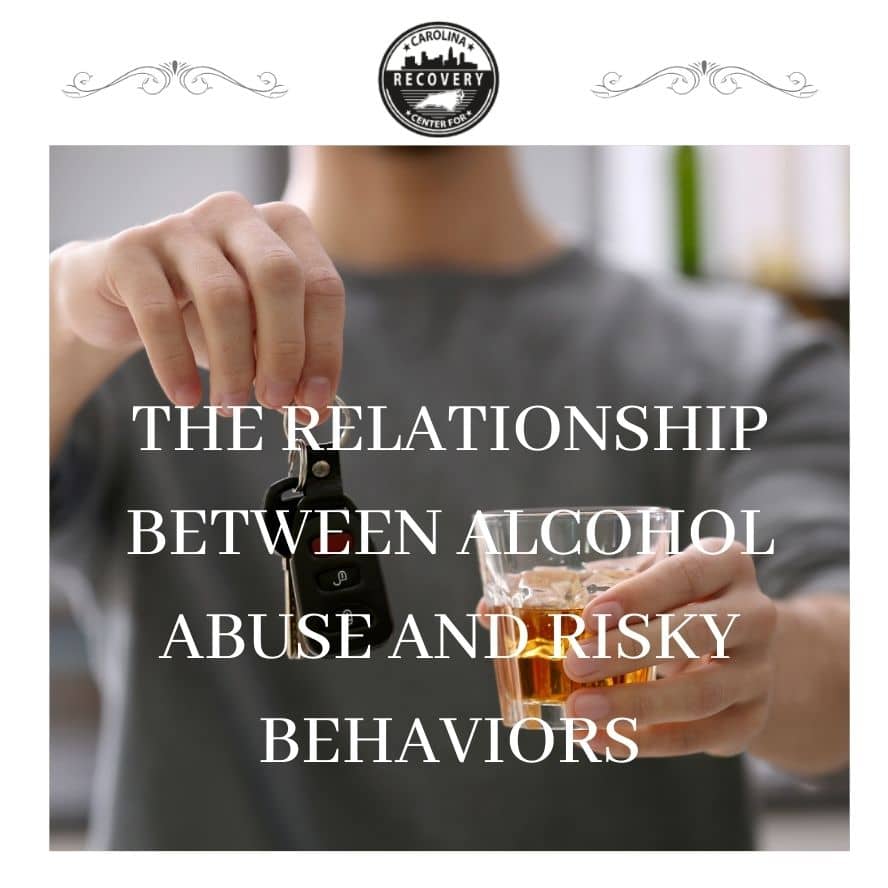The Relationship Between Alcohol Abuse and Risky Behaviors

Medically Verified: 2/1/24
Medical Reviewer
Chief Editor

All of the information on this page has been reviewed and verified by a certified addiction professional.
Alcohol abuse can lead to many short and long-term health complications. It can also make people more likely to engage in risky behaviors with life-threatening consequences.
Alcohol impairs a person’s judgment and can lower their inhibitions. Alcohol alters a person’s thinking and mood, which can cause them to do things they wouldn’t if they were sober.
While not everyone will experience the same level of altered judgment and reduced inhibitions, the effects of alcohol can be profound, and it’s essential to understand the link between alcohol abuse and risky behaviors.
Reach out to the addiction specialists at Carolina Center for Recovery today to learn about our supportive detox and treatment programs to help you begin your recovery journey.
Understanding Alcohol Abuse: How Much is Too Much?
The Centers for Disease Control and Prevention (CDC) provides guidelines about including alcohol in a generally healthy lifestyle and advises drinking only in moderation.[1] But what exactly does moderate drinking mean?
Moderate drinking is not associated with any known long-term health risks or complications. However, many people struggle to drink moderately and may develop an unhealthy relationship with alcohol. Unhealthy patterns of drinking include heavy drinking and binge drinking.
Heavy drinking is defined as:
- Eight or more alcoholic drinks per week for women
- Fifteen or more alcoholic beverages per week for men
Regular heavy drinking is linked to some serious health risks and long-term complications, including certain types of cancer, liver disease, new or worsening mental health conditions, and heart disease. It also significantly increases the likelihood of a person developing alcohol dependence or addiction.
Binge drinking is an unhealthy pattern of drinking where people consume a lot of alcohol –usually five or more drinks–in a short period.[2] Binge drinking can lead someone to engage in risky behaviors.
The Relationship Between Alcohol Abuse and Risky Behaviors
Alcohol abuse is linked to an increased risk of a variety of risky behaviors, including:
Alcohol and violent behaviors
Alcohol abuse can lead to higher incidents of aggression or violence. Alcohol disrupts normal brain functioning and can make people more likely to exhibit aggressive or violent behaviors. Some research shows that as many as 86% of people who committed homicide were drinking at the time of the offense. Similarly, 60% of sexual offenders and 57% of men convicted of domestic violence were intoxicated when they committed these crimes.[3]
Alcohol, car accidents, and DUIs
Driving under the influence puts everyone at risk of death or severe injury. When a person’s blood alcohol concentration (BAC) exceeds 0.08, their judgment, attention, and information processing are slowed. This can result in the inability to maintain their car’s position on the road, slower reaction times when braking, and the failure to maintain a proper speed.
In 2021, an estimated 13, 384 people died in alcohol-impaired driving traffic deaths, which is a 14% increase from 2020.[4]
Alcohol and risky sexual behavior
Alcohol use can increase the likelihood that someone will engage in risky sexual behaviors by lowering inhibitions and impairing judgment. Some examples of risky sexual behavior include:
- Having sex at an early age
- Multiple sexual partners
- Unprotected sex
- Forced sex
- Having sex with someone who injects drugs or has multiple sexual partners
Unwanted pregnancies, legal issues, and HIV or STIs are expected consequences of risky sexual behaviors. Studies show that in any given year, 400,000 college students report having sex without a condom after drinking.[5]
The Lifelong Consequences of Alcohol Abuse and Risky Behaviors
Research shows that alcohol abuse contributes to a sharp rise in preventable deaths among young people. If you were to look at mortality rates across the lifespan, you’d see a dramatic increase during adolescence–and about 75% of these deaths would be preventable.
Motor vehicle accidents are the most common cause of death during young adulthood. About 1 in 3 accidents that result in a fatality involve alcohol. Despite the significant number of young people dying in alcohol-related car crashes, many people engage in risky behaviors while drinking on a regular basis. In a recent study, 33% of college-aged respondents admitted to engaging in risky behaviors after drinking.[6] These include:
- Driving while intoxicated
- Binge drinking–having more than five alcoholic drinks on a single occasion
- Being a passenger in a car where the driver has been drinking
Risky sexual behaviors are also a concern. Alcohol can lower a person’s inhibitions and make it more likely they’ll have unsafe, unplanned, or unwanted sex. Research shows that people under 25 account for almost half of all sexually transmitted infections in the United States.[7]
Unplanned pregnancies can occur when someone has sex under the influence. Intoxicated people are less likely to use protection than sober people, especially those under the age of 19. Research shows that nearly 1 in 20 teens 15-19 gave birth in the year 2000 and that teen drinking rates have only grown since then.
Find Help Now
Alcohol abuse can lead to risky situations. Don’t put your health, safety, and future at risk. Get the treatment you need to overcome alcohol abuse and alcoholism. Contact the caring specialists at Carolina Center for Recovery today to explore your alcoholism treatment options and find support during recovery.
References:
- https://www.cdc.gov/alcohol/fact-sheets/moderate-drinking.htm
- https://www.ncbi.nlm.nih.gov/pmc/articles/PMC6104965/
- https://www.ph.ucla.edu/sciprc/pdf/ALCOHOL_AND_VIOLENCE.pdf
- https://www.nhtsa.gov/risky-driving/drunk-driving
- https://www.ncbi.nlm.nih.gov/pmc/articles/PMC5123847/
- https://www.niaaa.nih.gov/publications/brochures-and-fact-sheets/college-drinking
- https://www.cdc.gov/std/life-stages-populations/adolescents-youngadults.htm

